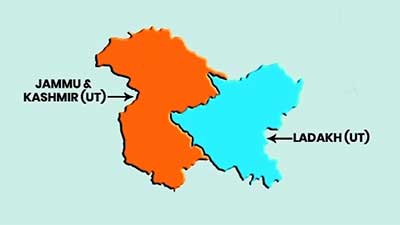Relevance: GS-2: Statutory, Regulatory and various Quasi-Judicial Bodies.
Key phrases: Delimitation, Kashmir
Why in news?
- J&K Delimitation Commission on Monday proposed to increase six seats for the Jammu division and one for the Kashmir division
Analysis:
What is delimitation?
- Under the provisions of the Delimitation Commission Act. The main task of the commission is redrawing the boundaries of the various assembly and Lok Sabha constituencies based on a recent census.
- The delimitation exercise is carried out by an independent high-powered panel known as the Delimitation Commission whose orders have the force of law and cannot be questioned by any court.
- Aside from changing the limits of a constituency, the process may result in change in the number of seats in a state.
- The representation from each State is not changed during this exercise. However, the number of SC and ST seats in a state are changed in accordance with the census.
- Under Article 82, the Parliament enacts a Delimitation Act after every Census.
Importance of delimitation
- To provide equal representation to equal segments of a population.
- Fair division of geographical areas so that one political party doesn’t have an advantage over others in an election.
- To follow the principle of “One Vote One Value”.
Current status of delimitation in India
- In the 2009 General elections, 499 out of total 543 Parliamentary constituencies were newly delimited constituencies.
- Delimitation Commissions have been set up four times — 1952, 1963, 1973 and 2002 under the Acts of 1952, 1962, 1972 and 2002.
Special case of J&K
- The delimitation exercise in J&K in the past has been slightly different from those in the rest of the country because of the region's special status.
- The delimitation of Lok Sabha seats was then governed by the Indian Constitution in J&K, but the delimitation of Assembly seats was governed separately by the Jammu and Kashmir Constitution
- However, Jammu and Kashmir lost its special status and was divided into two Union Territories (J&K and Ladakh) after the abrogation of its special status under Article 370,
- Following this, a special delimitation commission was constituted on 6th March, 2020 to carve out Assembly and Parliament seats in the UT.
Why is there a controversy with J&K delimitation?
- Delimitation of J&K is a politically volatile issue since it is directly related to the representation of Muslim-dominated Kashmir and Hindu-dominated Jammu in the legislative assembly.
- Many Kashmiri leaders refused to participate, stating that the Jammu and Kashmir Reorganisation Act of 2019 was “palpably unconstitutional” and that till the time the Supreme Court decides the constitutional validity of this law, no decisions (read delimitation) emanating from the Act should be implemented.
- Before reorganization act was passed by J&K Assembly passed a law putting a freeze on the fresh delimitation of seats until 2026. This freeze was upheld by the Supreme Court and local leaders want this to be followed
Recommendations by commission
- Proposed to increase six seats for the Jammu division and one for the Kashmir division
- Reserving 16 seats for the Scheduled Caste (SC) and Schedule Tribe (ST) communities in the Union Territory
- Commission has also, for some districts, proposed carving out of an additional constituency to balance the representation for geographical areas having inadequate communication and lack of public conveniences due to their excessive remoteness or inhospitable conditions on the international border
Way ahead
- For country wide delimitation pending in 2026 A national consensus exercise should be started to sort out issues much before 2026.
- The weightage given by the Finance Commission to population can be reduced to 10%, or even 5%.to iron out issues between regions
Source: The Hindu









